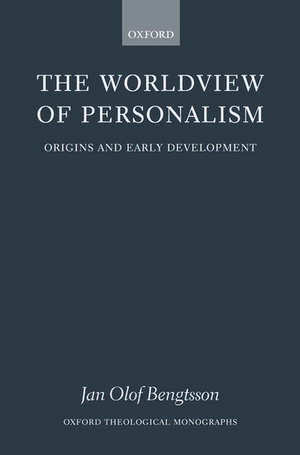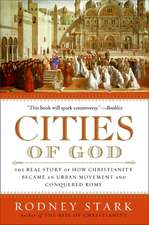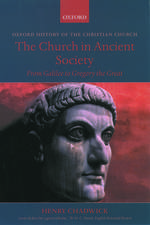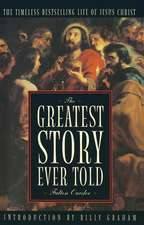The Worldview of Personalism: Origins and Early Development: Oxford Theological Monographs
Autor Jan Olof Bengtssonen Limba Engleză Hardback – 2 noi 2006
Din seria Oxford Theological Monographs
- 34%
 Preț: 1007.04 lei
Preț: 1007.04 lei - 30%
 Preț: 790.64 lei
Preț: 790.64 lei - 30%
 Preț: 589.19 lei
Preț: 589.19 lei - 50%
 Preț: 731.43 lei
Preț: 731.43 lei - 34%
 Preț: 861.71 lei
Preț: 861.71 lei - 34%
 Preț: 1124.04 lei
Preț: 1124.04 lei - 50%
 Preț: 904.45 lei
Preț: 904.45 lei - 34%
 Preț: 1034.50 lei
Preț: 1034.50 lei - 34%
 Preț: 1214.92 lei
Preț: 1214.92 lei - 34%
 Preț: 1108.59 lei
Preț: 1108.59 lei - 34%
 Preț: 1008.01 lei
Preț: 1008.01 lei - 31%
 Preț: 830.53 lei
Preț: 830.53 lei - 30%
 Preț: 592.17 lei
Preț: 592.17 lei - 31%
 Preț: 1055.67 lei
Preț: 1055.67 lei - 51%
 Preț: 888.07 lei
Preț: 888.07 lei - 51%
 Preț: 1009.65 lei
Preț: 1009.65 lei - 34%
 Preț: 1110.14 lei
Preț: 1110.14 lei - 31%
 Preț: 1433.85 lei
Preț: 1433.85 lei - 34%
 Preț: 1346.50 lei
Preț: 1346.50 lei - 30%
 Preț: 615.90 lei
Preț: 615.90 lei - 34%
 Preț: 1121.56 lei
Preț: 1121.56 lei - 34%
 Preț: 1122.53 lei
Preț: 1122.53 lei - 34%
 Preț: 1534.02 lei
Preț: 1534.02 lei - 34%
 Preț: 1006.30 lei
Preț: 1006.30 lei - 34%
 Preț: 1243.05 lei
Preț: 1243.05 lei - 34%
 Preț: 1124.01 lei
Preț: 1124.01 lei - 30%
 Preț: 745.79 lei
Preț: 745.79 lei - 18%
 Preț: 323.22 lei
Preț: 323.22 lei - 34%
 Preț: 876.33 lei
Preț: 876.33 lei - 34%
 Preț: 1197.45 lei
Preț: 1197.45 lei - 50%
 Preț: 612.09 lei
Preț: 612.09 lei - 30%
 Preț: 922.53 lei
Preț: 922.53 lei - 34%
 Preț: 860.41 lei
Preț: 860.41 lei - 34%
 Preț: 1182.15 lei
Preț: 1182.15 lei - 34%
 Preț: 860.59 lei
Preț: 860.59 lei - 34%
 Preț: 859.44 lei
Preț: 859.44 lei - 30%
 Preț: 1344.27 lei
Preț: 1344.27 lei - 19%
 Preț: 333.62 lei
Preț: 333.62 lei - 22%
 Preț: 527.72 lei
Preț: 527.72 lei - 34%
 Preț: 1007.84 lei
Preț: 1007.84 lei - 27%
 Preț: 377.18 lei
Preț: 377.18 lei - 34%
 Preț: 1196.80 lei
Preț: 1196.80 lei - 30%
 Preț: 729.47 lei
Preț: 729.47 lei - 28%
 Preț: 405.92 lei
Preț: 405.92 lei - 34%
 Preț: 1007.00 lei
Preț: 1007.00 lei - 34%
 Preț: 1079.73 lei
Preț: 1079.73 lei - 28%
 Preț: 448.56 lei
Preț: 448.56 lei
Preț: 1053.48 lei
Preț vechi: 1516.89 lei
-31% Nou
Puncte Express: 1580
Preț estimativ în valută:
201.61€ • 209.71$ • 166.44£
201.61€ • 209.71$ • 166.44£
Carte tipărită la comandă
Livrare economică 04-10 aprilie
Preluare comenzi: 021 569.72.76
Specificații
ISBN-13: 9780199297191
ISBN-10: 0199297193
Pagini: 320
Dimensiuni: 160 x 240 x 25 mm
Greutate: 0.64 kg
Editura: OUP OXFORD
Colecția OUP Oxford
Seria Oxford Theological Monographs
Locul publicării:Oxford, United Kingdom
ISBN-10: 0199297193
Pagini: 320
Dimensiuni: 160 x 240 x 25 mm
Greutate: 0.64 kg
Editura: OUP OXFORD
Colecția OUP Oxford
Seria Oxford Theological Monographs
Locul publicării:Oxford, United Kingdom
Recenzii
Once in a great while a book comes along that is so crucial to an area of study as to be assured of setting the tone in that domain of scholarship for many decades to come... The fuller story of personalism's history was delayed largely because the research required to unearth it would have to be done in Europe and England and by a person fully fluent in at least English, German, and French. What was needed was a first-rate historian of ideas, and one willing to invest a decade in the project. Fortunately for us, such a scholar eventually appeared. Jan Olof Bengtsson has completed the book many other scholars awaited and sincerely hoped someone else would write. The result has been gratifying. The book... will become the handbook of those who study personalism and the reference book for those whose areas touch upon it... The book is economical in its language but grand in its sweep.
a major new work of intellectual history... exhibiting the highest standards of scholarship, including a truly impressive erudition... The book is at once richly informative and analytically incisive. Only a person with a broad and advanced mastery of the history of Western thought could have written a study of such simultaneous scope and depth... it would surprise me greatly if in years to come this book will not be regarded as the authoritative, standard work on its subject and that scholars will declare: 'Bengtsson says', and 'according to Bengtsson'... His book contributes significantly to intellectual history but also to the continuing development of personalism.
Jan Olof Bengtsson's The Worldview of Personalism is, if anything, a historical tour de force. While the book's aim goes beyond mere history readers cannot but be impressed by its account of the early personalists and their influence on later writers. The discussion of Jacobi, Schelling, and Lotze is particularly noteworthy; and with this discussion the development of both European and Anglo-American personalism must hereafter be seen in a new light.
provides a history of the origins of European personalism that has not existed in English... remarkable... an exceptional work in the history of ideas and the history of philosophy... [a] magnificent history of early personalism
an admirable mastery and orderly deployment of a great mass of detailed study
While most of the focus is on philosophical figures, Bengtsson treats personalism as a worldview, rather than a single doctrine, and notes that it was a broad intellectual movement with wider cultural influences. It is a key virtue of the book to bring together a large range of thinkers, over a long period of time, who worked in a variety of languages.
a major new work of intellectual history... exhibiting the highest standards of scholarship, including a truly impressive erudition... The book is at once richly informative and analytically incisive. Only a person with a broad and advanced mastery of the history of Western thought could have written a study of such simultaneous scope and depth... it would surprise me greatly if in years to come this book will not be regarded as the authoritative, standard work on its subject and that scholars will declare: 'Bengtsson says', and 'according to Bengtsson'... His book contributes significantly to intellectual history but also to the continuing development of personalism.
Jan Olof Bengtsson's The Worldview of Personalism is, if anything, a historical tour de force. While the book's aim goes beyond mere history readers cannot but be impressed by its account of the early personalists and their influence on later writers. The discussion of Jacobi, Schelling, and Lotze is particularly noteworthy; and with this discussion the development of both European and Anglo-American personalism must hereafter be seen in a new light.
provides a history of the origins of European personalism that has not existed in English... remarkable... an exceptional work in the history of ideas and the history of philosophy... [a] magnificent history of early personalism
an admirable mastery and orderly deployment of a great mass of detailed study
While most of the focus is on philosophical figures, Bengtsson treats personalism as a worldview, rather than a single doctrine, and notes that it was a broad intellectual movement with wider cultural influences. It is a key virtue of the book to bring together a large range of thinkers, over a long period of time, who worked in a variety of languages.
Notă biografică
Jan Olof Bengtsson teaches the history of ideas at Lund University.














